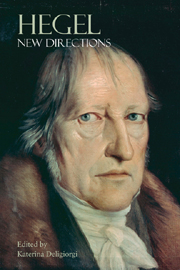Book contents
- Frontmatter
- Contents
- Contributors
- Acknowledgements
- Abbreviations
- Introduction: On reading Hegel today
- 1 Hegel on conscience and the history of moral philosophy
- 2 The apperceptive I and the empirical self: towards a heterodox reading of “Lordship and Bondage” in Hegel's Phenomenology
- 3 Hegel, McDowell and recent defences of Kant
- 4 Substance, subject and infinity: a case study of the role of logic in Hegel's system
- 5 Dialectic as logic of transformative processes
- 6 Hegel, ethics and the logic of universality
- 7 Recognition and reconciliation: actualized agency in Hegel's Jena Phenomenology
- 8 The contemporary relevance of Hegel's practical philosophy
- 9 Catching up with history: Hegel and abstract painting
- 10 New directions in Hegel's philosophy of nature
- 11 Hegel and the gospel according to Immanuel
- 12 What is conceptual history?
- 13 On Hegel's interpretation of Aristotle's psyche: a qualified defence
- Bibliography
- Index
8 - The contemporary relevance of Hegel's practical philosophy
- Frontmatter
- Contents
- Contributors
- Acknowledgements
- Abbreviations
- Introduction: On reading Hegel today
- 1 Hegel on conscience and the history of moral philosophy
- 2 The apperceptive I and the empirical self: towards a heterodox reading of “Lordship and Bondage” in Hegel's Phenomenology
- 3 Hegel, McDowell and recent defences of Kant
- 4 Substance, subject and infinity: a case study of the role of logic in Hegel's system
- 5 Dialectic as logic of transformative processes
- 6 Hegel, ethics and the logic of universality
- 7 Recognition and reconciliation: actualized agency in Hegel's Jena Phenomenology
- 8 The contemporary relevance of Hegel's practical philosophy
- 9 Catching up with history: Hegel and abstract painting
- 10 New directions in Hegel's philosophy of nature
- 11 Hegel and the gospel according to Immanuel
- 12 What is conceptual history?
- 13 On Hegel's interpretation of Aristotle's psyche: a qualified defence
- Bibliography
- Index
Summary
The question concerning the contemporary relevance of Hegel's practical philosophy has many different aspects to it. Some commentators see Hegel's thought as an anticipation of the debate between liberalism and communitarianism, others interpret it as a critical diagnosis of society from the normative perspective of communicative freedom (Honneth 2000), while others regard it as an attempt to develop a kind of collective self-reflection on the relevant criteria of truth and justice (Pinkard 1994; Brandom 2001). In the following discussion, I should like to defend three theses:
(I) Hegel presents us with a theory of social differentiation, or rather of “full differentiation” [Ausdifferenzierung], that does not simply abandon the claim of “practical philosophy” to be a normative science.
(II) Hegel distinguishes different levels within a unified concept of right that involves all the “generations” of fundamental rights, as they have recently been called, and simultaneously thematizes the question concerning their historical realization.
(III) Hegel's philosophy of right contains a concept of the political that is critically relevant to contemporary discussions concerning the appropriate role of the state.
For Hegel, the principle of “actuality”, and of its “scientific” comprehension through philosophy, implies a process of self-differentiation, or an immanent differentiation into independent systems that obey their own internal “logic”, that is to say, display an inner coherence of their own. Both the kind of differentiation and the inner logic involved vary according to whether we are considering the realm of nature, society, culture or pure thought.
- Type
- Chapter
- Information
- HegelNew Directions, pp. 143 - 158Publisher: Acumen PublishingPrint publication year: 2006
- 3
- Cited by

